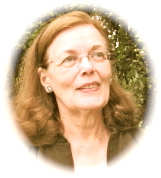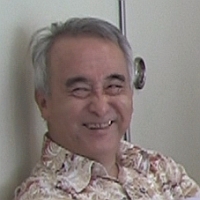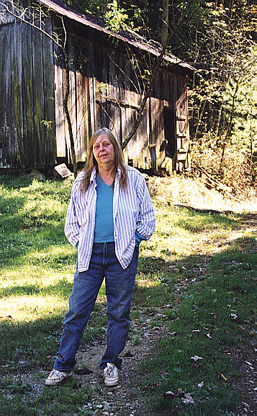1939
-
Lyles, Peggy Willis
Peggy Willis Lyles
(17 September 1939 – 3 September 2010)
 John Stevenson, editor of The Heron's Nest,wrote: “Peggy Willis Lyles was a giant presence in the world of English-language haiku during the last quarter of the twentieth century and the first decade of this century. Those who came to know and admire Peggy's published work were enriched by the encounter.” And indeed Peggy was one of the most authentic poets writing English-language haiku, and she was deeply respected by all who knew her. According to Randy M. Brooks, editor of her book To Hear the Rain, in Peggy’s haiku “time seems to stand still in a scene that will be as true tomorrow as it was a hundred years ago.”
John Stevenson, editor of The Heron's Nest,wrote: “Peggy Willis Lyles was a giant presence in the world of English-language haiku during the last quarter of the twentieth century and the first decade of this century. Those who came to know and admire Peggy's published work were enriched by the encounter.” And indeed Peggy was one of the most authentic poets writing English-language haiku, and she was deeply respected by all who knew her. According to Randy M. Brooks, editor of her book To Hear the Rain, in Peggy’s haiku “time seems to stand still in a scene that will be as true tomorrow as it was a hundred years ago.”Peggy Willis Lyles was born in Summerville, South Carolina, on September 17, 1939. Peggy earned her B.A. from Columbia (S.C.) College and an M.A. in English from Tulane University; where she was a Woodrow Wilson Fellow for 1960-61. Peggy taught briefly at Sophie Newcomb College, High Point (N.C.) High School, High Point College, and the University of Georgia. She was Poetry Editor of a regional magazine Georgia Journal from 1980-85. Peggy contributed regularly to leading haiku journals and magazines for more than 30 years. She was a long-time member of the Haiku Society of America and lived with her husband Bill in Tucker, Georgia where she died from complications of cancer on September 3, 2010.
Reading the first edition of Cor van den Heuvel’s The Haiku Anthologyconvinced her of the sparkle and value of English-language haiku. Since the late 1970’s her work was published regularly in leading journals in the United States and abroad. She has won the most prestigious of the haiku awards, and here haiku are included in many anthologies and haiku classics such as The Haiku Handbook, by William J. Higginson with Penny Harter and The Haiku Anthology, 2nd and 3rd editions, edited by Cor van den Heuvel. She judged competitions for the Haiku Society of America, the North Carolina Haiku Association, the Poetry Society of Georgia, the Tallahassee Writer’s Association, and other groups. Peggy was a member of The Red Moon Anthology staff and editor at The Heron's Nest. During her eight years as an editor with The Heron's Nest she managed to influence so many people, and her work will continue to touch so many souls in the future.
Peggy once wrote, "Sometimes we say too much. Words get in the way. . . . A good haiku offers just enough words, just the right words, to recreate the essence of a specific time and place and hold it permanently available."
Awards and some other Honours:
- A few of Peggy's awards include: The Museum of Haiku Literature Award (4 times); The Haiku Calendar Contest, winners and runners-up (1999-2009);
- First Place, The World Haiku Festival 2000 Poetry Competition; The Heron's Nest Readers' Choice Award (2000);
- The Heron's Nest Poet of the Year Award (2001);
- Honourable Mention, The Harold G. Henderson Memorial Contest (Haiku Society of America,1980, 1986);
- Commended, Mildred Kanterman Merit Book Award (Haiku Society of America, 2003);
- Grand Prize [with Paul MacNeil and Ferris Gilli, 2004 and 2008], Grand Prize [with Billie Wilson, Carolyn Hall, and Mark Brooks, 2002], Second Prize [with Paul MacNeil and Ferris Gilli, 2001], Honorable Mention [with Mark Brooks, Christopher Herold, Paul MacNeil, Billie Wilson, and Carol O'Dell, 2005]: The Bernard Lionel Einbond Renku Competition (Haiku Society of America);
- Mayfly Best-of-Issue Haiga Award;
- The Scorpion Prize;
- Sakura Award, The Vancouver Cherry Blossom Festival;
- First Place, The Robert Frost Poetry Festival Haiku Competition;
- Second and Third Place, The Kusamakura Award;
- Third Place, The Robert Spiess Memorial Haiku Contest (2008).
Books Published:
- Red Leaves in the Air (Battle Ground, Indiana: High/Coo Press, 1979);
- Still at the Edge (Oneonta, NY: Swamp Press, 1980);
- Prisms (a Wind Chimes Haiku Sheet, 1986)
- Thirty-Six Tones (Normal, IL: Saki Press, 1999);
- To Hear the Rain: Selected Haiku of Peggy Lyles (Decatur, IL: Brooks Books, 2002).
Selected haiku:
summer night
we turn out all the lights
to hear the rain(Cicada [Canada] IV:4, 1980; H.F. Noyes' Favorite Haiku 2, 1999)
*
a mayfly
taps the screen--
warm beets slip their skins(Mayfly #1, 1986)
*
wind and rain
the hand I reach for
in the dark(Frogpond XVIII:3, 1995)
*
Gershwin's lullaby
magnolia petals ladle
fireflies(Mayfly #29, 2000, and Best-of-Issue Haiga for #30, 2001)
*
Indian summer
a turtle on a turtle
on a rock(Heron's Nest Award winner for Volume III, #10, December 2001)
*
shimmering pines
a taste of the mountain
from your cupped hands(Mayfly #31, 2001)
*
boarding call
the ripe banana flavor
of the small one's cheek
into the night
we talk of human cloning
snowflakes
autumn sea
a little girl’s love
of small brown shells
bread rising
yellow crocuses
fill with snow(To Hear the Rain: Selected Haiku of Peggy Lyles, Clothbound, 2002)
*
deep chords
from the practice room
a bee stirs apple mint(The Heron's Nest IV:2, 2002)
*
scattered stars
the space between us
tastes of pine(Brocade of Leaves - Haiku North America Conference Anthology, 2003)
*
not quite goodbye--
an ocean beats
against the rocks(Modern Haiku 40:3, 2009)
Sources:
- http://www.thehaikufoundation.org/poet-details/?IDclient=77
- http://simplyhaiku.com/SHv7n2/haiku/Bios.html
- http://home.gci.net/~alaskahaiku/guestpoet.html
- http://www.brooksbookshaiku.com/brooksbooks/selectedlyles.html
- http://www.theheronsnest.com/awards/awards_2015.html
- http://www.ajc.com/news/news/local/peggy-willis-lyles-70-revered-haiku-poet/nQkCn/
- http://blogs.law.harvard.edu/ethicalesq/let-us-celebrate-peggy-lyles/
- http://tobaccoroadpoet.blogspot.co.uk/2008/05/peggy-lyles-three-questions.html
More of her work:
-
Maeda, Hiroshi (前田弘)
 Maeda Hiroshi (前田弘)
Maeda Hiroshi (前田弘)Born 1939 in Osaka, Japan
Moved to Hokkaido in 1943, and grew up there. In high school, he founded the haiku journal-group, Kaze [Wind], which later became Haguruma [Gears]. Studied haiku with Suzuki Ishio, and moved to Tokyo in 1963. He joined the Modern Haiku Association in 1982, becoming Executive Director [kanji], Chief of the Yearbook Department, and Chief of the Advertising Department of the MHA, in 2001. Became the official leader of the Haguruma journal-group in 2006. Later, became the chief editor of the Gendai Haiku Journal of the MHA. Won the 2010 “Second Prize,” 65th Modern Haiku Association Award. In the following year, won the “First Prize” of the 66th Modern Association Award.
Translations into English by Richard Gilbert & Ito Yuki (Gendaihaiku, 2014)
-
Mountain, Marlene
Marlene Mountain
(11 December 1939 – 15 March 2018)
 Marlene Mountain (born Marlene Morelock) was an American artist, writer, and haiku poet as well as social and political activist. She was born on 11 December 1939 in Ada, Oklahoma, and earned a Bachelor of Fine Arts from the University of Oklahoma and Master of Arts from the University of North Dakota in painting with a minor in literature. Her works have been included in many exhibitions and they strongly reflect her view on women's issues, environmental matters, and politics. She was a fiction and non-fiction writer and has printed cards, produced books and written plays with haiku incorporated. Marlene also taught courses in drawing and design. She painted and wrote in the mountains of Tennessee, from which later in 1982 she took her pseudonym.
Marlene Mountain (born Marlene Morelock) was an American artist, writer, and haiku poet as well as social and political activist. She was born on 11 December 1939 in Ada, Oklahoma, and earned a Bachelor of Fine Arts from the University of Oklahoma and Master of Arts from the University of North Dakota in painting with a minor in literature. Her works have been included in many exhibitions and they strongly reflect her view on women's issues, environmental matters, and politics. She was a fiction and non-fiction writer and has printed cards, produced books and written plays with haiku incorporated. Marlene also taught courses in drawing and design. She painted and wrote in the mountains of Tennessee, from which later in 1982 she took her pseudonym.In 1966 Marlene married John Wills, one of the first modern practitioners of English-language haiku, and she contributed minimalist artwork to his innovative 1970 collection ‘river’. She began writing haiku in 1968 and was one of the first haiku poets to focus on the one-line approach by way of analogy with the one-column vertical writing of Japanese haiku thus becoming a major contributor to the English-language haiku in her own right. Marlene also published numerous "concrete" poems for which she coined the term "unaloud haiku".
In recognition of her continuing devotion to the development of haiku and related arts in 2014-2015 Marlene Mountain was appointed as the Honorary Curator of the American Haiku Archives which include the HSA archives and is one of the largest public collection of haiku materials outside Japan.
Marlene also maintained a website that featured selections of her essays, reviews, paintings, calligraphy, poetry (incl. one-line poems, visual poems, unaloud haiku, dadaku, tearouts), and other creative art forms. She had a unique influential voice in the haiku circles and changed some preconceptions by developing her own style. For instance in her ground-breaking essay, "One-Image Haiku" (first published in the Australian haiku journal Tweed and reprinted in A Haiku Path), Marlene challenged the idea that haiku must consist of two juxtaposed images. In his review of her first book, the old tin roof, (1976) considered to be one of the most seminal books of haiku ever published, Cor van den Heuvel wrote that some of the best poems in that collection "immediately placed [her] in the front rank of American haiku poets."
Until her death on 15 March 2018 Marlene Mountain stayed true to herself and continued to write with outspoken conviction, developing, experimenting and mastering the possibilities inherent to the haiku genre.
Books by Marlene Mountain:
- the old tin roof,haiku senryu & dadaku; & unaloud haiku not yet termed, 1976, 97 pages, right side only, plastic-coil bound, 3.5 x 8.5 inches, self-published, Tennessee;
- new bridge,
- aware becoming,haiku sequence/visual haiku, c 1977/78;
- moments/moments,unaloud haiku, High/Coo Press, 1978;
- naturenotes,unaloud haiku, mid-1970s;
- preying mantis,unaloud haiku, poemcard #11 High/Coo Press 1979;
- femmarks,3 sets of bookmarks, self-published 1981/82;
- solstice cards,1981 to present;
- equal hell, art,haiku, untamed haiku & beyond untamed haiku, booklet and 40 cards, including 4 bumper stickers,1982, self-published, Tennessee;
- a poem, women,poems and haiku, early 80s/abandoned [hal roth, editor];
- tonight i am mountain,
- pissed off poems and cross words,haiku sequences & 13 sketches for painting series, 1986, 32 pages, saddle-stitched, 8.5 x 7 inches, self-published, Tennessee;
- intimate posters,haiku with images c. 135 images, self-produced/published 1990;
- a crone’s haiku highcoup,haiku criticisms via captions to “famous art” c. 255 images, self-produced, 1992;
- from the mountain,book of 20+ years of one-line haiku, etc., with annotations and visuals, 1992, self-published;
- ? lined-paper blues,tear outs;
- femail boxes and junk male,development of a painting series, text and visuals, self-produced/published 1993;
- home away from home,development of a painting series, text and visuals, self-produced/published 1993;
- nature talks back,tear outs, etc., self-produced/published 1994;
- visualante,tear outs, etc., self-produced/published 1994;
- now you too,dadaku/high coup, self-produced/published 1994;
- when the mountain comes over the moon,tear outs, etc., self-produced early 90s;
- how to flounder and fiddle,the making of 2 unaloud haiku, self-produced;
- cur*rent,
- ,[book one] 2000, Kris Kondo, Marlene Mountain, Francine Porad, one-line linked haiku & color artwork, 85 pages, perfectbound, 5.5 x 5.5 inches, Vandina Press;
- ,[1 volume] 2000, Kris Kondo, Marlene Mountain, Francine Porad, one-line linked haiku & artwork, 116 pages, perfectbound, 8.5 x 5.5 inches, Vandina Press;
- trio of wrens,[book four] 2000, Kris Kondo, Marlene Mountain, Francine Porad, one-line linked haiku & artwork, foreword by Dennis H. Dutton, 64 pages, perfectbound, 8.5 x 5.5 inches, Vandina Press;
- ,[unpublished], one-line linked haiku with Francine Porad and Kris Kondo, 2001;
- ,[unpublished], one-line linked haiku with Francine Porad and Kris Kondo, 2001;
- ,[unpublished], one-line linked haiku with Francine Porad and Kris Kondo, 2001;
- ,[unpublished], one-line linked haiku with Francine Porad and Kris Kondo, 2002;
- ,[unpublished], one-line linked haiku with Francine Porad and Kris Kondo;
- mother nature’s heat/a desert snake,
- probably ‘real’ renga sorta,
- probably ‘real’ renga sorta 2,
Awards and Other Honours:
- Outstanding Senior in Art;
- Lew Wentz Service Scholarship;
- Special Commendation in Painting, Drawing, Graphics;
- Mothers' Association Scholarship;
- Alumni Development Fund Purchase Award;
- Delta Phi Delta National Art Fraternity.
Selected Haiku:
o g
r
f frog
(the old tin roof, Marlene Wills, 1976)
*
alone-
the taste of summer water
from the faucet
(Cicada 1:3 (1977)
*
pig and i spring rain
(Frogpond2:3-4 (1979)
*
seed catalog in the mailbox cold drizzle
(Frogpond3:1 (1980)
*
he leans on the gate going staying
(AmoskeagI (University of Southern New Hampshire, 1984)
*
old pond a frog rises belly up
(Pissed Off Poems and Cross Words (1986); Modern Haiku 17:3 (1986)
*
winter night writing letters to get letters
(Modern Haiku 17:1 (1986)
*
thrush song a few days before the thrush
(Modern Haiku 21:3 (1990)
*
end of the cold spell
i’d forgotten the color
of my under socks
stick
my neighbor’s rooster hops the i throw
(the old tin roof, Marlene Wills, 1976; van den Heuvel, The Haiku Anthology 3 (1999)
*
on this cold
spring 1
2 night 3 4
kittens
wet
5
(moments/moments, unaloud haiku, High/Coo Press, 1978; van den Heuvel, The Haiku Anthology 3 (1999)
*
together as we dry there is the listening to rain
(Global Haiku: Twenty-five Poets World-wide (George Swede/Randy Brooks, Mosaic Press, Canada, 2000)
*
one fly everywhere the heat
(Cicada 2:1 (1977); van den Heuvel, The Haiku Anthology 2 (1986); Global Haiku: Twenty-five Poets World-wide(George Swede/Randy Brooks, Mosaic Press, Canada, 2000); van den Heuvel, The Haiku Anthology 3 (1999); Blithe Spirit 10:4 (2000)
*
spin on dead and wounded any scratch of pines
(Haiku in English: The First Hundred Years, ed. by Philip Rowland, Allan Burns; W. W. Norton & Company, 2013)
With gratitude to Charles Trumbull who has kindly provided most information for this profile. Many thanks indeed!
Selected Essays:
- http://www.marlenemountain.org/essays/haikuessays.html
- http://www.tempslibres.org/tl/en/livres/mm00.html
- http://www.marlenemountain.org/essays/essay_jphaiandso.html
- http://www.marlenemountain.org/essays/essay_letter_whatsthe.html
- http://www.marlenemountain.org/essays/sinterview_innerview.html
Sources:
- http://www.marlenemountain.org
- https://www.flickr.com/photos/marlenemountain
- http://www.marlenemountain.org/mminfo/mi_background.html
- http://www.thehaikufoundation.org/poet-details/?IDclient=104
- http://www.marlenemountain.org/mminfo/mi_mmpublications.html
- http://www.marlenemountain.org/mminfo/mi_anthologies.html
- http://www.americanhaikuarchives.org/curators/MarleneMountain.html
- https://www.thehaikufoundation.org/thf-haiga-galleries/image-haiku-of-marlene-mountain/
- https://livinghaikuanthology.com/poets-on-haiku/defining-haiku/2905-evolving-consciousness-by-marlene-mountain.html
